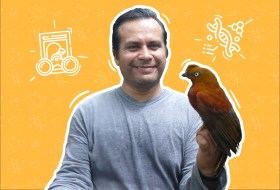News
This is the story of a Unicaucano who dedicates his life to birds: ornithology, memory, and pure conservation from the Natural History Museum.
This May 10th, during Global Big Day, thousands of people around the world will come together to record bird sightings. In light of this date and in celebration of World Migratory Bird Day, we present to you Luis Germán Gómez Bernal, a tenured professor in the Department of Biology at the University of Cauca. A biologist deeply passionate about ornithology, he has dedicated his life to observing, studying, and conserving birds, as well as to strengthening the scientific legacy of our Alma Mater’s Natural History Museum. This is one of those #StoriesThatInspire!
Global Big Day is an annual birdwatching event organized by the Cornell Lab of Ornithology (based in the United States). It brings together birdwatchers—also known as “birders”—from around the world on the second Saturday of May. Its goal? To record as many bird species as possible in a single day and raise awareness about the importance of bird conservation.
That’s why, within the framework of this celebration—and also as we begin the month of honoring our professors through these #StoriesThatInspire—we invite you to learn more about the work of a teacher deeply committed to birds: Luis Germán Gómez Bernal.
This biologist, a graduate of the National University of Colombia, holds a master’s degree in Wildlife Conservation and Management from the National University of Costa Rica and a PhD in Biological Sciences (Biodiversity and Conservation). He is currently a tenured professor in our Faculty of Natural, Exact, and Educational Sciences, director of our university’s Natural History Museum, and curator of its Ornithological Collection. He is also an active member of several associations such as the Colombian Ornithological Association, the Cauca Ornithological Association, and the Cauca Birdwatchers Association.

Provided photo
“I graduated as a biologist in 1991, but I started birdwatching in 1985. After completing my master’s in Costa Rica, I joined the University of Cauca in 1999, focusing on zoology, ecology, and biodiversity conservation,” says Professor Germán, who has conducted research focused on the birdlife of regions such as Amazonas, Cauca, Valle, Caquetá, Putumayo, Huila, and Nariño.
And when it comes to birds, we must certainly mention the Bird Collection at the Natural History Museum, which dates back to 1936, the year the museum was founded. Over its nearly 90 years of existence, the museum has faced numerous challenges—one of the most difficult being the 1983 earthquake. During that devastating time for our city, the museum also lost part of its preserved materials. That’s why this passionate Unicaucano shares his contribution:
“The goal of my current research is to assess how representative the preserved birds in the collection are compared to the total number of bird species recorded in Cauca.”
He adds, “We can conclude that the collection represents 55% of the region’s bird species, making it the most complete in the world with regard to Cauca’s birds. Most records come from Popayán and surrounding areas, which highlights the need to strengthen research in other parts of the department.”

Provided photo
Beyond science, Professor Germán has emphasized the importance of reconnecting with nature. “Today, the world is facing a severe environmental crisis, evidenced by the accelerated loss of species. We are witnessing the sixth mass extinction,” he warns, adding, “Species are essential for maintaining the ecological structure that supports our survival. If we care for and conserve birds and their habitats—forests, páramos, rivers, savannas, mangroves, seas—we are contributing to both common well-being and the health of the biotic environment.”
The message for this 2025 Global Big Day is clear: observe attentively, learn with humility, and act with commitment! For this reason, from this house of knowledge located in the department of Cauca—blessed with unmatched richness and biodiversity—we encourage not only our Unicaucano community but also the people of the region to explore this invaluable heritage. Not just through birdwatching, but also by visiting the Natural History Museum—a place that safeguards fascinating natural treasures that tell us who we are. It’s time to become aware of the care and respect all living beings and their environments deserve.
Written by: Communications Management Center


